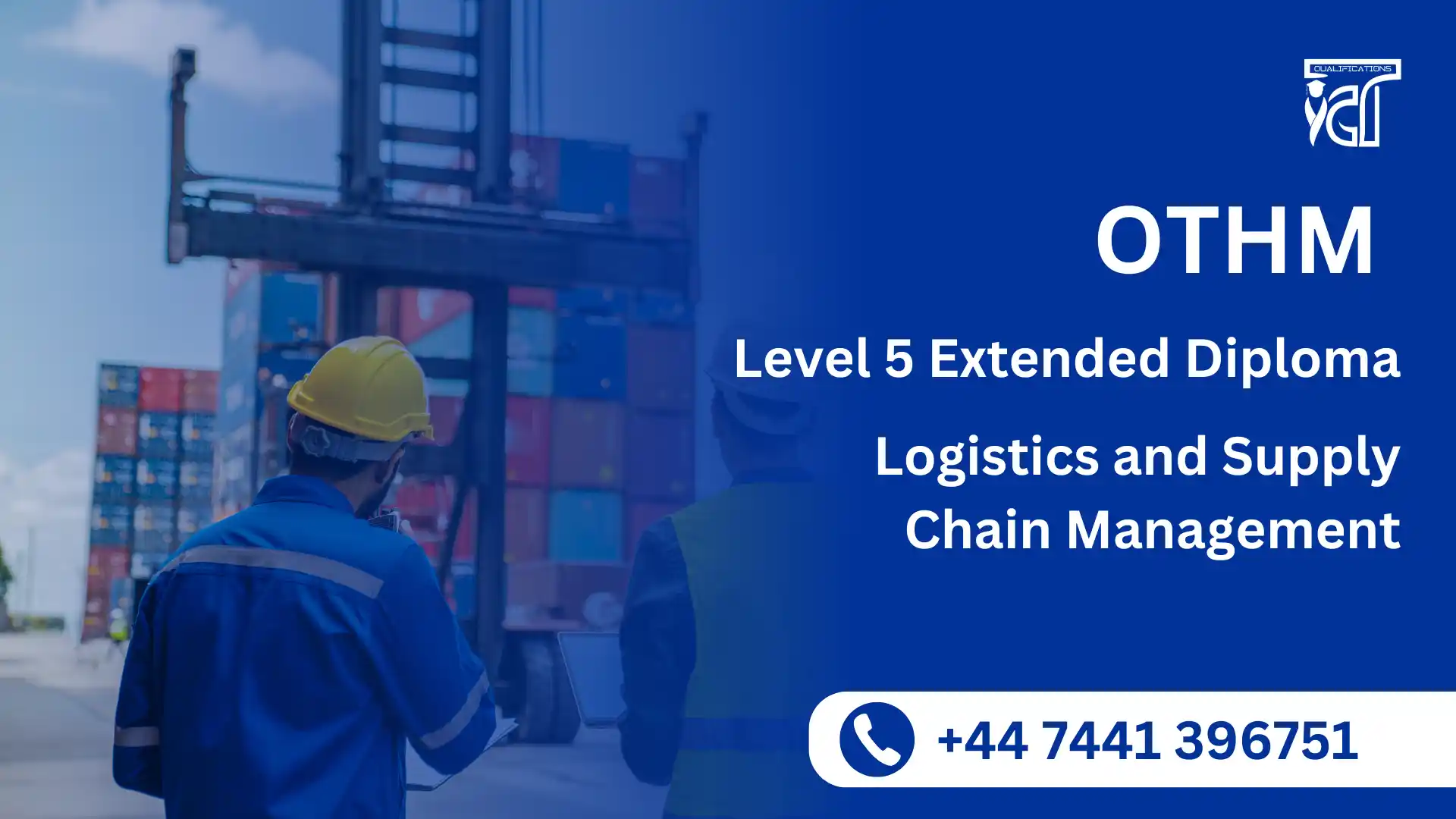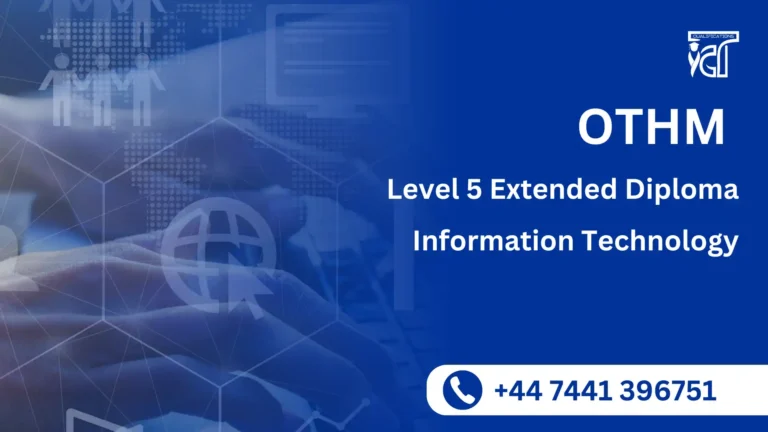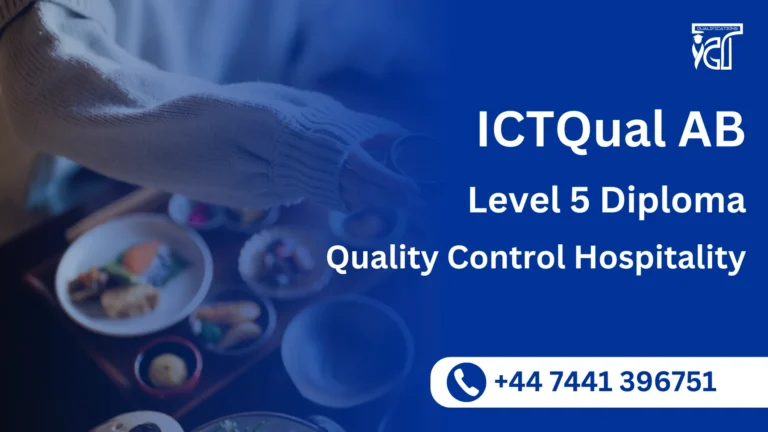In today’s fast-paced and globalized economy, businesses rely heavily on efficient logistics and supply chain management to remain competitive. The OTHM Level 5 Extended Diploma in Logistics and Supply Chain Management offers a highly relevant, Ofqual-regulated qualification designed to equip students with the essential skills and knowledge to excel in this dynamic industry.
This qualification is ideal for individuals looking to develop their expertise in logistics, operations, and supply chain management, providing them with a solid foundation to pursue senior roles within the sector.
The OTHM Level 5 Extended Diploma in Logistics and Supply Chain Management is an Ofqual-regulated qualification that is designed for learners who wish to develop advanced skills in logistics, supply chain management, and related fields. The qualification is structured to meet the needs of professionals who wish to progress in their careers, as well as individuals seeking to enter the field of logistics and supply chain management.
The OTHM Level 5 Extended Diploma in Logistics and Supply Chain Management is an essential qualification for those looking to excel in the rapidly growing field of logistics and supply chain management. Whether you are just starting your career or seeking to advance within the industry, this Ofqual-regulated qualification provides you with the expertise, practical skills, and flexibility needed to succeed. The assignment-based structure, coupled with its global recognition, makes it an excellent choice for learners looking to make their mark in logistics and supply chain management.
OTHM Level 5 Extended Diploma in Logistics and Supply Chain Management
The OTHM Level 5 Extended Diploma in Logistics and Supply Chain Management comprises 12 mandatory units, totaling 240 credits and 2400 hours of Total Qualification Time (TQT). The recommended Guided Learning Hours (GLH) for this qualification is a minimum of 1200 hours.
To obtain the OTHM Level 5 Extended Diploma in Logistics and Supply Chain Management, learners must complete 240 credits in total, with 120 credits at Level 4 (6 units) and 120 credits at Level 5 (6 units).
Level 4 Mandatory units:
| Sr# | Unit Title | Credits | GLH |
|---|---|---|---|
| 1 | Academic Writing and Research Skills | 20 | 100 |
| 2 | Logistics and the Business Environment | 20 | 100 |
| 3 | Operations and Logistics Management | 20 | 100 |
| 4 | Finance and Accounting | 20 | 100 |
| 5 | Communication in Business | 20 | 100 |
| 6 | Leading and Managing Teams | 20 | 100 |
Level 5 Mandatory units:
| Sr# | Unit Title | Credits | GLH |
|---|---|---|---|
| 1 | Principles and Concepts of Strategy | 20 | 100 |
| 2 | Procurement and Inventory Management | 20 | 100 |
| 3 | Contract and Financial Management | 20 | 100 |
| 4 | Global Context of Supply Chains | 20 | 100 |
| 5 | Principles and Concepts of Supply Chain Management | 20 | 100 |
| 6 | Contemporary Issues in Supply Chain Management | 20 | 100 |
GLH (Guided Learning Hours) and TQT (Total Qualification Time) are terms commonly used in vocational qualifications to help define the amount of time a learner is expected to spend on heir studies.
1. GLH (Guided Learning Hours)
GLH refers to the number of hours a learner spends being directly taught, supervised, or supported during their course. This includes the time spent in activities such as:
- Classroom instruction
- Practical workshops
- One-on-one tutoring or mentoring sessions
- Online learning sessions with tutor support
In other words, GLH represents the time that learners are actively engaged with their instructors or learning activities.
2. TQT (Total Qualification Time)
TQT represents the total amount of time a learner is expected to invest in completing a qualification, including:
- GLH (Guided Learning Hours): Time spent on direct learning, as explained above.
- Self-Directed Learning: This includes time spent on independent study, research, assignment completion, preparation for exams, and any other work the learner does outside of direct teaching hours.
TQT is a broader measure that includes all the time required to achieve the qualification. It helps learners and employers understand the overall commitment required for the qualification.
Key Differences Between GLH and TQT:
- GLH focuses on direct learning with guidance or supervision.
- TQT includes GLH as well as independent study time and other learning-related activities.
Example:
If a qualification has a TQT of 600 hours and a GLH of 250 hours, it means the learner should spend 250 hours in direct learning (classroom, online, or tutor-led sessions) and 350 hours on independent study or research.
Learning Outcomes of OTHM Level 5 Extended Diploma in Logistics and Supply Chain Management
Academic Writing and Research Skills
- Understand the concept and purpose of academic research and writing.
- Understand how to conduct academic research.
- Be able to demonstrate critical thinking skills
- Understand how to construct a reliable and valid academic argument.
Logistics and the Business Environment
- Understand the business of logistics.
- Understand the relationships between different logistic functions.
- Be able to measure a logistic business’s internal environment.
Operations and Logistics Management
- Understand the fundamentals of operations management.
- Understand the fundamentals of logistics management
- Know about warehousing and inventory management.
- Understand transportation and distribution.
Finance and Accounting
- Understand the role of the finance and accounting function in a logistics business.
- Understand the sources of finance available to a logistics business.
- Be able to prepare and monitor a budget.
- Be able to analyse the performance of a logistics business.
Communication in Business
- Understand the concept and purpose of communication in a business context.
- Be able to effectively communicate in a business context.
- Understand how a business communicates internally
- Understand how a business communicates externally
Leading and Managing Teams in logistics operations
- Understand leadership and management.
- Understand how teams are developed.
- Understand how to improve individual and team performance.
- Be able to determine own capacity to be an effective leader and manager.
Principles and Concepts of Strategy
- Understand the principles of business strategy.
- Understand key business strategy theories and concepts.
- Be able to measure a business’s micro and macro environment.
- Understand a business’s strategic options.
Procurement and Inventory Management
- Understand the fundamentals of procurement management.
- Understand the relationship between procurement and the supply chain.
- Understand the fundamentals of inventory management.
- Understand the relationship between inventory management and the supply chain.
Contract and Financial Management
- Understand contract management in logistics.
- Understand how to manage a contract in logistics.
- Understand the fundamentals of financial management in logistics.
- Understand how finances are managed in logistics.
Global Context of Supply Chains
- Understand the fundamentals of globalisation.
- Understand the impact of globalisation on supply chains.
- Understand how to establish a global supply chain.
- Understand how to manage a global supply chain
Principles and Concepts of Supply Chain Management
- Understand fundamental supply chain management (SCM) concepts and principles.
- Understand supply chain management (SCM) flows.
- Understand the barriers to effective supply chain management (SCM).
- Understand the complexities of relationships in supply chains.
- Understand the role of leadership in a supply chain.
Contemporary Issues in Supply Chain Management
- Understand the impact of emerging technologies on supply chain management (SCM).
- Understand the impact of supply chains on the environment.
- Understand supply chain management (SCM) in a global economy.
- Understand the management of risk in supply chains.
The OTHM Level 5 Extended Diploma in Logistics and Supply Chain Management offers numerous benefits to individuals seeking to advance their careers in logistics, supply chain management, and related fields. Here are the key benefits of completing this course:
1. Develop Advanced Skills in Logistics and Supply Chain Management
- Gain in-depth knowledge of the key concepts, strategies, and best practices in logistics and supply chain management.
- Develop the ability to analyze and optimize supply chains, manage logistics operations efficiently, and make data-driven decisions.
2. Increase Career Opportunities
- This qualification enhances your employability by providing you with the knowledge and skills that are highly sought after in industries such as manufacturing, retail, and transportation.
- It prepares you for managerial roles, offering a pathway to senior positions within logistics and supply chain functions.
3. Internationally Recognized Qualification
- OTHM qualifications are recognized by employers worldwide, making it an excellent option for those wishing to pursue global career opportunities.
- The diploma is aligned with the UK’s Qualifications and Credit Framework (QCF) and is recognized by higher education institutions, allowing students to progress to further study or obtain credit for their learning.
4. Pathway to Further Education
- After completing the Level 5 Extended Diploma, learners can progress to higher qualifications, such as a bachelor’s degree or postgraduate studies in logistics, supply chain management, or business administration.
- This diploma can also serve as a stepping stone for those who wish to pursue professional certifications in logistics and supply chain management.
5. Practical Application of Knowledge
- The course focuses on real-world scenarios, allowing learners to apply theoretical knowledge to practical situations in logistics and supply chain management.
- Through case studies, assignments, and simulations, students gain hands-on experience that prepares them for challenges in the industry.
6. Improve Strategic and Operational Decision-Making
- Learn how to plan, implement, and evaluate logistics and supply chain strategies at both operational and strategic levels.
- Gain the skills needed to identify supply chain risks, mitigate issues, and ensure the smooth flow of goods and services across the supply chain.
7. Enhanced Leadership and Management Skills
- Develop essential leadership and managerial skills, including team management, communication, and problem-solving.
- Learn how to lead projects, manage budgets, and handle cross-functional teams effectively within the logistics and supply chain domains.
8. Flexible Learning and Study Options
- The Level 5 Extended Diploma is often available through a variety of learning modes, including online, part-time, and full-time, allowing flexibility for working professionals.
- This makes it accessible to individuals with different schedules and learning preferences.
9. Networking Opportunities
- Engage with a network of industry professionals, fellow students, and instructors, creating valuable connections that can help advance your career.
- Take part in industry events, conferences, and seminars to expand your knowledge and build a professional network.
10. Improve Business Performance
- Learn how to assess and improve the performance of a company’s logistics and supply chain operations, ensuring cost efficiency and enhanced customer satisfaction.
- Understand how to integrate technology and innovation in logistics to improve supply chain visibility and optimize operational workflows.
By completing the OTHM Level 5 Extended Diploma in Logistics and Supply Chain Management, students are equipped with a comprehensive set of skills that are directly applicable to real-world challenges in the industry. This qualification not only boosts career prospects but also enables students to make a meaningful impact in the field of logistics and supply chain management.
The ideal learner for the OTHM Level 5 Extended Diploma in Logistics and Supply Chain Management is someone who is motivated, proactive, and looking to advance their career or build expertise in the logistics and supply chain industry. This qualification is designed for individuals who have a keen interest in the practical aspects of supply chain management, logistics operations, and business processes. Below are the key characteristics of the ideal learner:
1. Career-Focused Professionals
- The ideal learner is typically already working in the logistics, supply chain, or related fields and wants to develop their skills further.
- They are looking to advance to higher-level roles, such as supply chain manager, logistics coordinator, or operations manager, and need a qualification that will equip them with both strategic and operational expertise.
2. Individuals Seeking Career Transition
- Someone from a related field (e.g., business, operations, or project management) who wants to transition into logistics and supply chain management would find this course suitable.
- This learner is motivated to switch careers or expand their professional qualifications in order to pursue opportunities within the logistics and supply chain industry.
3. Aspiring Leaders and Managers
- The course is perfect for individuals aspiring to become leaders or managers within their organization.
- Ideal learners will have aspirations of stepping into managerial positions where they can influence business decisions, lead teams, and manage logistics and supply chain operations effectively.
4. Goal-Oriented Individuals
- Ideal learners are individuals with clear professional goals who understand the value of gaining advanced qualifications to further their career development.
- They possess a strong drive to apply knowledge gained from the course to improve operations, optimize supply chains, and contribute to the success of their organization.
5. Motivated and Independent Learners
- Since the course often offers flexibility in terms of learning modes (online, part-time, or full-time), the ideal learner should be self-motivated, capable of managing their time efficiently, and committed to independent study.
- They should be prepared to engage with course materials, complete assignments, and participate in discussions and group work as needed.
6. Learners with Relevant Academic Background
- Although the course is open to anyone with a keen interest in logistics and supply chain management, the ideal learner would typically have a background in business, economics, management, or a related field.
- Having basic knowledge of business functions, economics, or operations would be advantageous in understanding key concepts in the curriculum.
7. Technologically Savvy Individuals
- In the modern logistics and supply chain world, technology plays a central role. The ideal learner should be comfortable with technology, digital tools, and software used in logistics, inventory management, and data analysis.
- They should be keen to learn about emerging technologies like AI, automation, and blockchain and how these can be applied in supply chain management.
8. Individuals Seeking Global Career Opportunities
- Learners who want to pursue international opportunities in logistics and supply chain management would benefit from this qualification, as OTHM is globally recognized and accepted.
- The ideal learner is open to working in diverse environments and interacting with global supply chains.
9. Problem-Solvers and Critical Thinkers
- The ideal learner enjoys tackling complex problems, analyzing situations, and coming up with effective solutions.
- They are adept at thinking critically about logistics challenges, such as optimizing transportation routes, managing inventory, and reducing costs, and are eager to use their newfound knowledge to drive improvement.
10. Collaborative Team Players
- Although the course encourages independent study, the ideal learner should also have strong teamwork and communication skills.
- Many logistics and supply chain management roles involve collaboration across departments and with external partners, so the ability to work effectively in teams is crucial.
In summary, the ideal learner for the OTHM Level 5 Extended Diploma in Logistics and Supply Chain Management is someone who is driven, career-oriented, and ready to apply advanced logistical and supply chain knowledge to real-world business scenarios. Whether they are seeking to advance within their current career, transition into the field, or take on leadership roles, this qualification provides the skills and knowledge needed to succeed in a competitive and evolving industry.
Entry Requirements
Register Now
Qualification Process
Qualification Process OTHM Level 5 Extended Diploma in Logistics and Supply Chain Management
- Self-Assessment:
Begin by evaluating your eligibility to ensure you meet the qualification requirements, including work experience, knowledge, and language proficiency. - Registration:
Complete your registration by submitting the required documents, including a scanned copy of a valid ID, and paying the registration fee. - Induction:
An assessor will conduct an induction to confirm your eligibility for the course and explain the evidence requirements. If you do not meet the criteria, your registration will be canceled, and the fee will be refunded. - Assignments & Evidence Submission:
Provide all assignments and the necessary evidence based on the assessment criteria outlined in the course. If you are unsure of the required evidence, consult with the assessor for guidance on the type and nature of evidence needed. - Feedback and Revision:
The assessor will review your submitted evidence and provide feedback. Evidence that meets the criteria will be marked as “Criteria Met,” while any gaps will be identified. You will be asked to revise and resubmit if needed. - Competence Evidence:
Submit final evidence demonstrating that all learning outcomes have been met. This evidence will be marked as “Criteria Met” by the assessor once it is satisfactory. - Internal Quality Assurance (IQA):
The Internal Quality Assurance Verifier (IQA) will review your evidence to ensure consistency, quality, and compliance with standards. - External Verification:
The IQA will submit your portfolio to OTHM External Quality Assurance Versifier (EQA) for final confirmation. The EQA may contact you directly to verify the authenticity of your evidence. - Certification:
Upon successful completion of all checks, OTHM will issue your official certificate, confirming that you have attained the OTHM Level 5 Extended Diploma in Logistics and Supply Chain Management







